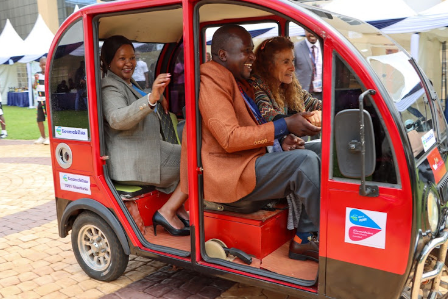Zetech University has introduced an electric-powered tuk-tuk as part of its efforts to enhance the transport sector and reduce carbon emissions. Prof. Gitau Kamau, a lecturer at the university, explained that the tuk-tuk operates without an engine and is equipped with rechargeable batteries capable of lasting over 100 km.
Additionally, solar panels integrated into the roof capture energy to support its operation.
“We have assembled the tuk-tuk, put in electric motors and solar panels to recharge its batteries once they get drained. It is noiseless, cost effective and clean,” the professor said during the university’s Innovation week.
While it is built like other tuk-tuks, the electric-powered model is faster, with a speed of over 60 km/hr.
The cost is also slightly higher than the normal tuk-tuks, at Sh450,000.
Kamau’s motivation is to provide an efficient and eco-friendly mode of transport, reducing reliance on conventional fuels and minimising environmental impact.
“The vehicle doesn’t use fuel thus reducing carbon emissions as well as making it cost-effective, during this time when the cost of fuel is high,” he said.
“The vehicle doesn’t use fuel thus reducing carbon emissions as well as making it cost-effective, during this time when the cost of fuel is high,” he said.
The innovation is yet to be released into the market.
Kamau cited the high cost of e-mobility equipment used to assemble the vehicle as a major challenge in the mass production of tuk-tuks.
To make it cheaper to manufacture, the professor urged the government to come up with policies that support adoption of e-mobility and eliminate excise duty on body parts.
“The tuk-tuks are made of steel, which is quite expensive. If only its cost and that of other accessories can be lowered, the mass production of the tuk-tuks can be cheaper and easy.”
Spaces in the Special Economic Zones should be set aside for the assembly of body parts.
“E-mobility is the way to go and the government has been categorical that by 2027, most of the vehicles will be electric. In order to achieve this, there should be policies in place that support e-mobility,” Kamau said.
He suggested that county governments should permit tuk-tuks to park and operate freely within central business districts (CBDs) as they contribute positively to carbon credit trading.
Kenya aims to transition to fully electric buses by 2027 as part of its strategy to transform the transport sector and reduce carbon emissions to address climate change.
Former Investment, Trade, and Industrialisation CS Rebecca Maino noted that the ministry has introduced the Draft National Electric Mobility Policy to support this transition. The policy includes proposals for incentives to boost the adoption of electric vehicles, such as reducing the excise duty on electric-powered vehicles to 10 percent, as outlined in the Finance Act, 2023.
Additionally, efforts include revising the Integrated National Transport Policy (2009) to integrate electric vehicles and the necessary infrastructure, and developing an Automotive Policy to encourage the assembly and manufacture of electric vehicles.



